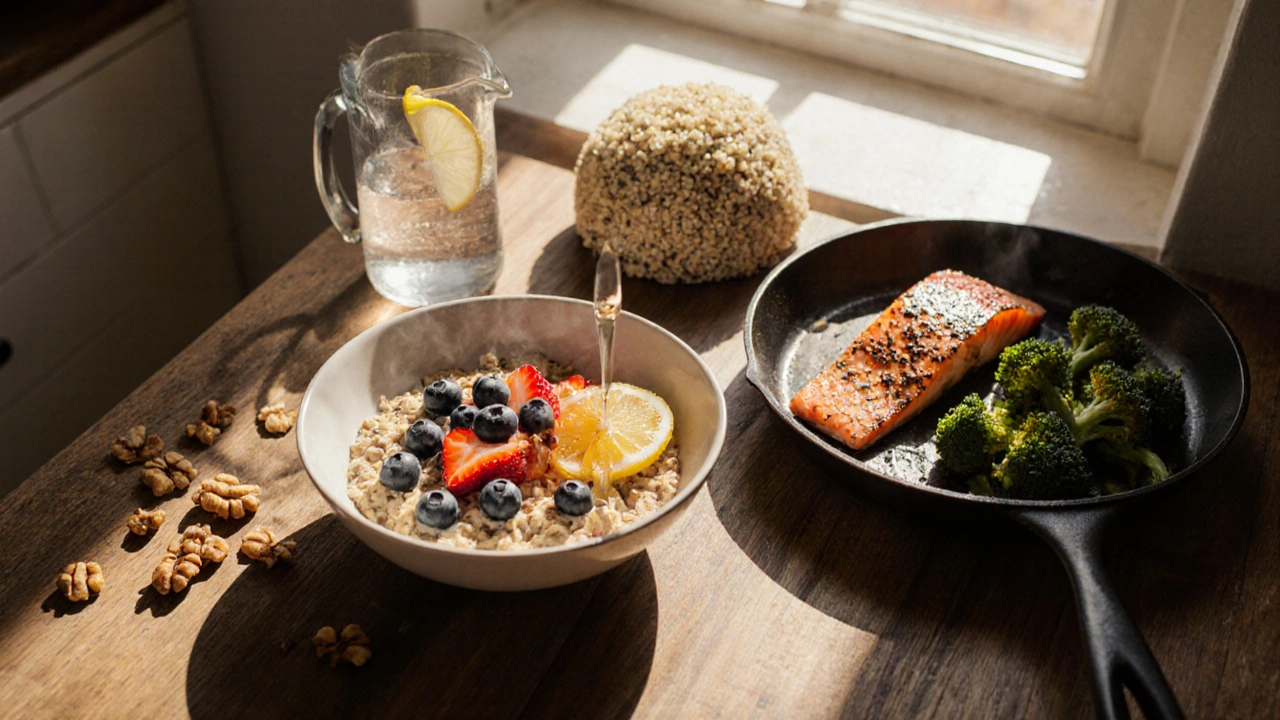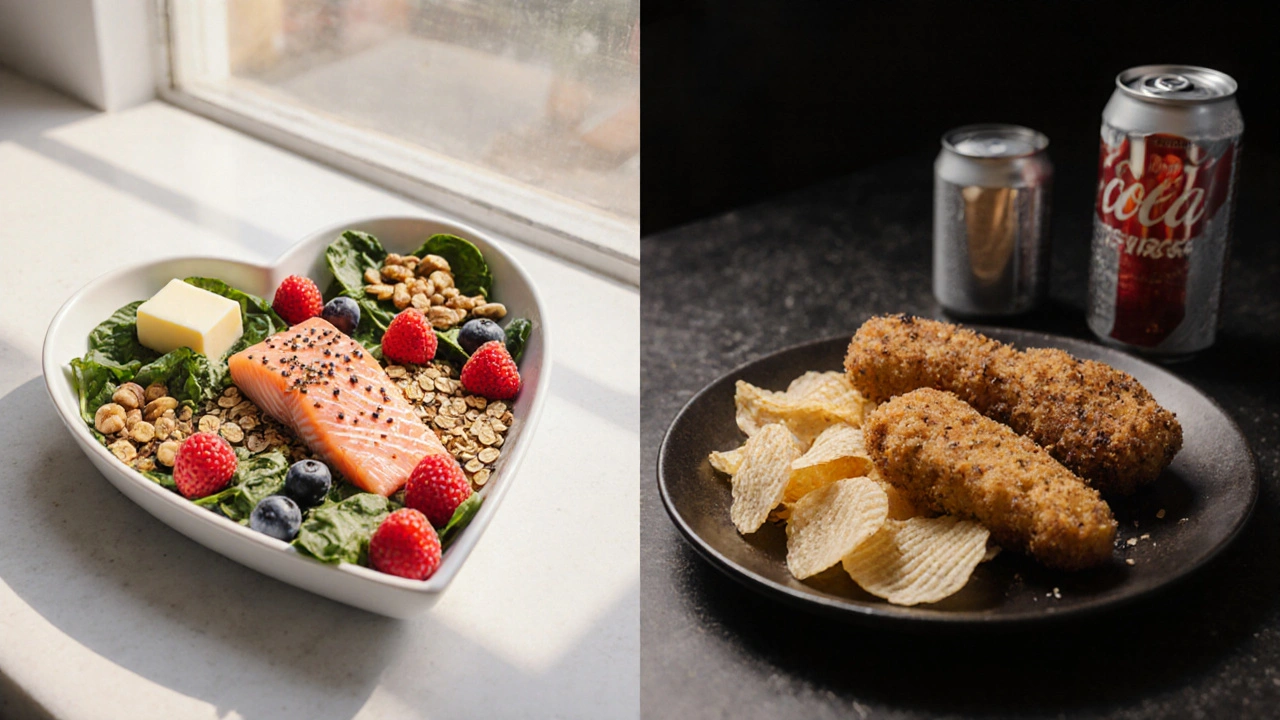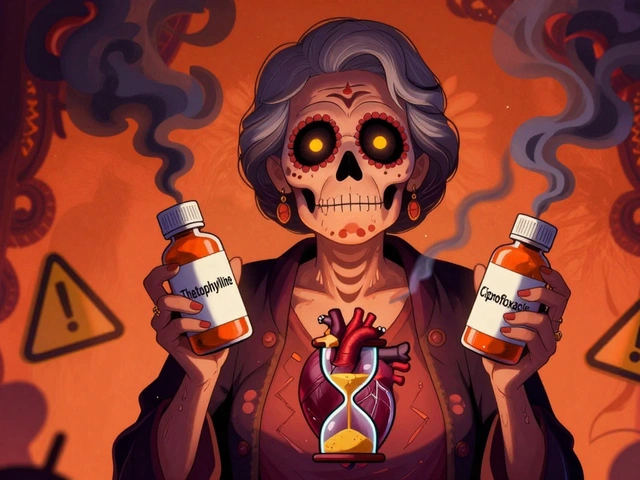When it comes to keeping your heart in shape, what you put on your plate matters more than any quick‑fix pill. A heart-healthy diet can lower plaque buildup, improve blood flow, and even reverse early signs of coronary artery disease (CAD). Below you’ll find the science‑backed foods to load up on, the ones to ditch, and practical tips to turn these choices into everyday meals.
Why Diet Matters for Heart Health
Coronary Artery Disease is the narrowing or blockage of the coronary arteries caused by a buildup of cholesterol‑rich plaques. When arteries narrow, the heart receives less oxygen, leading to chest pain, shortness of breath, or even a heart attack. Diet influences three key risk factors:
- Blood cholesterol levels - saturated and trans fats raise LDL (bad) cholesterol.
- Blood pressure - excess sodium and processed foods push pressure up.
- Inflammation - sugary drinks and refined carbs trigger chronic inflammation.
Targeting these factors with the right foods can keep arteries clear and the heart pumping smoothly.
Foods to Embrace
Here are the nutrient powerhouses that have the strongest evidence for protecting against CAD.
- Omega-3 Fatty Acids found in fatty fish like salmon, mackerel, and sardines; they lower triglycerides and reduce inflammation.
- Soluble Fiber present in oats, barley, beans, and many fruits; it binds cholesterol in the gut and helps flush it out.
- Antioxidant Vitamins especially vitamin C (citrus, berries) and vitamin E (nuts, seeds); they protect blood vessels from oxidative damage.
- Whole Grains such as brown rice, quinoa, and whole‑wheat bread; they improve lipid profiles and keep blood sugar steady.
- Plant Sterols naturally occurring compounds in nuts, seeds, and fortified spreads; they block cholesterol absorption.
Foods to Skip
These items raise LDL cholesterol, spike blood pressure, or fuel inflammation.
- Saturated Fat found in fatty cuts of beef, butter, cheese, and coconut oil; it boosts LDL levels.
- Trans Fat often hidden in partially hydrogenated oils, baked goods, and fried fast food; it raises bad cholesterol and lowers good cholesterol.
- Sodium excessive salt in processed meats, canned soups, and snack chips; it drives up blood pressure.
- Added Sugars common in sodas, candy, and sweetened yogurts; they increase triglycerides and promote insulin resistance.
- Refined Carbohydrates white bread, pastries, and many breakfast cereals; they cause rapid blood sugar spikes and elevate inflammation.

Side‑by‑Side Comparison
| Category | Examples | Key Heart Benefit / Risk | Typical Serving Size |
|---|---|---|---|
| Eat | Salmon, sardines, tuna | Rich in omega‑3, lowers triglycerides | 3‑4 oz (≈ 100g) |
| Eat | Oats, barley, beans | High soluble fiber, reduces LDL | ½ cup cooked |
| Avoid | Butter, fatty cuts of red meat | High saturated fat, raises LDL | Limit to ≤ 1 serving/week |
| Avoid | Packaged cookies, fried fast food | Contains trans fat, damages HDL | Rarely, <1serving/month |
| Eat | Almonds, walnuts, chia seeds | Plant sterols & healthy fats, improve cholesterol profile | ¼ cup nuts or 2 tbsp seeds |
| Avoid | Soda, sweetened fruit drinks | Added sugars, raise triglycerides | Limit to ≤ 12oz per week |
Meal‑Planning Tips to Stay on Track
- Start every day with a bowl of oatmeal topped with berries and a sprinkle of walnuts.
- Replace butter with olive oil or avocado spread on toast and veggies.
- Swap white rice for quinoa or brown rice at lunch; add a side of steamed broccoli.
- Plan two fish meals per week - grill salmon with lemon, or toss sardines into a salad.
- Snack on raw carrots, hummus, or a small handful of unsalted nuts instead of chips.
- Flavor soups and sauces with herbs, garlic, and a dash of low‑sodium broth rather than salt.
Portion & Frequency Guide
Even heart‑healthy foods can tip the scale if you overeat. Here’s a quick cheat sheet:
- Fish: 2-3 servings per week, 3‑4 oz each.
- Whole grains: 3-5 servings daily (½ cup cooked grain counts as one).
- Nuts & seeds: 1‑2 servings per day (¼ cup or 2 tbsp).
- Fruit: 2‑3 servings daily, prioritize whole fruit over juice.
- Vegetables: Aim for at least 5 servings daily, half of them leafy green.
Common Pitfalls & How to Avoid Them
Switching to a heart‑healthy lifestyle isn’t just about buying the right groceries; it’s about avoiding everyday traps.
- “Healthy‑sounding” processed snacks - many are low‑fat but high in sugar and sodium. Read the label, look for no added sugars and under 140mg sodium per serving.
- Portion creep - a bowl of salad can hide a generous drizzle of full‑fat dressing. Use a tablespoon measure for oils and dressings.
- Skipping breakfast - leads to overeating later. A quick protein‑rich smoothie (Greek yogurt, berries, flaxseed) keeps cravings at bay.
- Relying on “diet” soda - artificial sweeteners may affect gut bacteria and appetite. Opt for sparkling water with a splash of citrus instead.
Key Takeaways
- Focus on omega‑3 rich fish, soluble fiber, whole grains, and antioxidant‑packed fruits and veg.
- Limit saturated fats, trans fats, sodium, added sugars, and refined carbs.
- Use the comparison table to plan balanced meals and keep serving sizes realistic.
- Adopt simple weekly habits - fish twice a week, oatmeal daily, nuts as snacks.
- Watch portion sizes and read labels to dodge hidden junk.
Frequently Asked Questions
Can I follow a heart‑healthy diet if I’m vegetarian?
Absolutely. Swap fish for plant‑based omega‑3 sources like flaxseed, chia seeds, and walnuts. Add soy products, lentils, and fortified plant milks for protein, and keep the same emphasis on whole grains, fruits, vegetables, and low‑sodium meals.
How much sodium is safe for heart health?
The American Heart Association recommends no more than 1,500mg per day for most adults. Try to stay under 2,300mg if you have higher blood pressure, and always check nutrition labels for hidden salt.
Is olive oil really better than butter for the heart?
Yes. Olive oil is high in monounsaturated fats, which can improve HDL (good) cholesterol and lower LDL. Use extra‑virgin olive oil for dressings and low‑heat cooking; reserve butter for occasional, small‑portion treats.
Do fruit juices count as healthy choices?
Generally no. Even 100% juice strips out fiber and concentrates sugars, spiking blood glucose. Whole fruit provides fiber and steadier energy. If you must have juice, limit it to 4‑6oz and pair with protein or fat.
Can I still enjoy desserts on a heart‑healthy plan?
Yes, with smarter swaps. Choose fruit‑based desserts, dark chocolate (≥70% cacao) in small portions, or Greek yogurt with honey and nuts. The key is moderation and limiting added sugars.








13 Comments
Dawson Turcott October 14, 2025
Yeah, because swapping a cheeseburger for oats totally fixes everything 😂
Alex Jhonson October 19, 2025
I get where you're comin from, but ya know, adding some berries or a sprinkle of nuts can be a fun way to boost flavor without turning the meal into a snoozefest.
Also, folks from different cultures already mix spices that are heart‑friendly, so it ain't that exotic.
Sorry if that sounds like preachin', just try it out.
Katheryn Cochrane October 23, 2025
The article pretends that simply eating salmon will magically reverse atherosclerosis, ignoring the chaotic reality of genetics, socioeconomic status, and adherence fatigue.
It cherry‑picks studies that show modest LDL reductions but never mentions the marginal impact on hard endpoints like myocardial infarction.
Moreover, the recommendation to avoid “refined carbs” is a blanket condemnation that disregards the role of whole‑grain alternatives.
The tone is overly optimistic and borders on hype.
Bottom line: diet is a piece of the puzzle, not a silver bullet.
Michael Coakley October 28, 2025
Oh, the philosopher in me loves the idea that a plate of quinoa can cleanse the soul, but the reality is a bit more... gritty.
If you think a few weeks of oatmeal will erase decades of endothelial damage, you might be living in a spreadsheet.
Nutrition is a marathon, not a sprint, and the cosmos doesn’t care about your salad timing.
So, enjoy the fish, but keep your expectations in check.
ADETUNJI ADEPOJU November 1, 2025
From a pathophysiological standpoint, the lipid‑lipoprotein cascade is modulated by sterol regulatory element‑binding proteins (SREBPs), and the article's simplification fails to acknowledge the intricate feedback loops.
While the recommendation to limit trans‑fat aligns with current AHA guidelines, the omission of endothelial shear stress metrics renders the guidance incomplete.
One must also consider nutrigenomic interactions when prescribing omega‑3 supplementation, lest we ignore epigenetic modifiers.
Nonetheless, the piece does a decent job of flagging sodium as a hypertensive agitator, albeit without quantifying milligram thresholds.
In sum, it’s a decent primer but lacks mechanistic depth.
Janae Johnson November 6, 2025
While I appreciate the attempt to democratize cardiac nutrition, I must posit that the binary of “eat this, avoid that” oversimplifies a multifactorial clinical landscape.
The recommendation to eschew all saturated fats neglects emerging data on medium‑chain triglycerides and their potential metabolic benefits.
Furthermore, the tone veers toward moralizing, which may alienate patients who already feel stigmatized.
I would advocate for a nuanced, patient‑centered dialogue rather than a prescriptive manifesto.
Respectfully, the article would benefit from acknowledging these complexities.
Kayla Charles November 10, 2025
First of all, let me say that adopting a heart‑healthy diet is one of the most empowering things you can do for your long‑term wellbeing, and the evidence behind it is pretty robust.
You start with the basics: load up on omega‑3 rich fish like salmon, mackerel, and sardines, because the anti‑inflammatory properties of EPA and DHA are well documented in randomized trials.
Pair that with soluble fiber sources such as oats, barley, beans, and a colorful variety of fruits, which bind cholesterol in the intestinal lumen and help lower LDL levels.
Don't forget about antioxidant vitamins-vitamin C from citrus and berries, and vitamin E from nuts and seeds-these act as scavengers for free radicals that can damage vascular endothelium.
Whole grains like brown rice, quinoa, and whole‑wheat bread provide not only sustained energy but also a beneficial effect on lipid profiles and glycemic control.
Plant sterols, naturally present in nuts and seeds, further block cholesterol absorption and should be part of daily snacking habits.
On the flip side, you want to avoid foods that are notorious for raising LDL and blood pressure: think fatty cuts of meat, butter, cheese, and coconut oil, all of which are high in saturated fat.
Trans fats, hidden in many processed baked goods and fried fast foods, are a no‑go because they raise bad cholesterol and lower good cholesterol simultaneously.
Sodium is another stealthy villain; processed meats, canned soups, and snack chips can easily push your intake far beyond recommended limits, contributing to hypertension.
Added sugars in sodas, candy, and even sweetened yogurts spike triglycerides and promote insulin resistance, so keep those to a minimum.
Refined carbohydrates like white bread and pastries cause rapid blood sugar spikes and inflammatory responses, so opt for whole‑grain alternatives whenever possible.
It’s also practical to plan your meals ahead of time: prep a big batch of quinoa on Sundays, portion out nuts for on‑the‑go snacks, and keep fresh fruit visible on the counter.
Cooking methods matter too; grill, bake, or steam your vegetables instead of frying them in butter.
Spice it up with herbs like rosemary, thyme, and garlic, which have their own cardioprotective properties.
Lastly, stay hydrated, limit alcohol, and pair your diet with regular physical activity for synergistic benefits.
By weaving these habits into your daily routine, you’ll not only support heart health but also set a strong foundation for overall vitality.
David McClone November 15, 2025
Oh sure, just sprinkle some chia seeds on everything and you’re basically a cardiologist now.
If that doesn’t work, you can always blame the universe.
Jessica Romero November 19, 2025
Alright, let’s unpack this from a practical standpoint-when you consider the dietary lipid profile, it’s not just about “good” vs “bad” fats but the intricate interplay of apolipoprotein isoforms, hepatic lipase activity, and postprandial lipemia.
For instance, swapping out a traditional beef patty for a lentil‑based burger isn’t just a calorie reduction; it also modulates the chylomicron response, which can have downstream effects on endothelial function.
Moreover, the sodium content in processed foods isn’t a simple number; it influences plasma volume, renin‑angiotensin activation, and ultimately peripheral resistance.
If you’re aiming for a comprehensive approach, incorporate the DASH diet principles-high potassium, magnesium, and calcium sources like leafy greens, nuts, and low‑fat dairy-to counterbalance the sodium load.
And let’s not overlook the psychosocial aspect: adherence improves when meals are culturally resonant, so think Mediterranean herbs, South‑Asian spices, or African grain blends.
In short, the article gives a solid foundation, but real‑world implementation requires layering these nuances onto the baseline recommendations for maximal cardioprotective impact.
Michele Radford November 24, 2025
The so‑called “science‑backed” list ignores the fact that many of these studies are industry‑funded and suffer from publication bias.
Also, the article fails to address inter‑individual variability in response to omega‑3 supplementation.
Bottom line: take it with a grain of salt.
Mangal DUTT Sharma November 28, 2025
Hey everyone 😊 I totally agree that making small, sustainable changes to our eating habits can have a huge impact on heart health over time.
For me, the journey started when I noticed my cholesterol numbers creeping up, so I began incorporating more fatty fish like salmon into my meals twice a week.
I also swapped out white rice for brown rice or quinoa, which not only adds fiber but also keeps me fuller longer, reducing the temptation to snack on processed foods.
Adding a handful of mixed nuts and seeds to my breakfast oatmeal provides a nice crunch and boosts my intake of plant sterols and vitamin E.
I’ve found that seasoning my dishes with garlic, turmeric, and ginger not only enhances flavor but also brings anti‑inflammatory benefits that are great for the cardiovascular system.
Of course, I still enjoy a treat now and then-maybe a small piece of dark chocolate or a homemade fruit smoothie-because balance is key to staying motivated.
Remember, consistency beats perfection, so celebrate each healthy choice you make, no matter how small.
Keep it up, and your heart will thank you! 💪
Gracee Taylor December 3, 2025
Thank you for sharing your experience, Mangal. It’s encouraging to see practical tips that blend nutrition science with everyday feasibility, and I think many readers will feel empowered to try these adjustments.
Leslie Woods December 7, 2025
Really nice summary of the guidelines thanks for posting